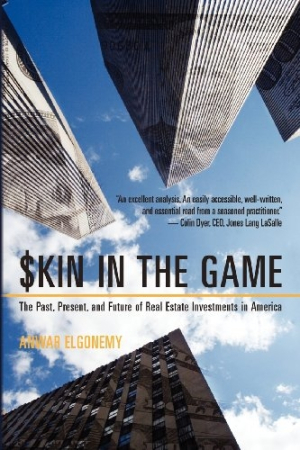Skin in the Game
The Past, Present, and Future of Real Estate Investments in America
“Like night follows day, misery follows greed,” laments Anwar Elgonemy in his comprehensive and very well-presented tome on the causes, calamities, and possible cures for the current economic crisis.
Drawing on his twenty-five years in real estate development, acquisition, finance, and investment, Elgonemy speaks with authority on how “extreme and unregulated capitalism,” paired with unbridled consumerism, brought down this “republic of money that worships commerce.” He explains in deep yet understandable detail the financial instruments that were created for “pure speculation” and struggles mightily to make sense of the “incomprehensible galaxy” of the “shadow banking system” where those instruments are played.
Skin in the Game: The Past, Present, and Future of Real Estate Investments in America is not a light or an easy read. Yet it is also not a dense business course textbook or a technical report so complex as to require a graduate degree from Harvard (which the author will receive this year). Elgonemy does not talk down to his audience, and he labors hard at constructing arguments that help his readers understand what went wrong.
This is no easy task. As Elgonemy notes: “The Great Recession from which the United States is still trying to recover was caused by a number of interconnected factors, including excessive, unsustainable debt levels and the failures of checks and balances at many different levels.” He could have taken the easy and populist way out, and while he does call to task many of the corporate “predators,” Elgonemy adds, “To pin the financial crisis on mortal flaws like greed and arrogance would be too simplistic. Rather, it was the failure to account for human weakness and error that is relevant to the financial meltdown.”
As the title hints, the core of the crisis can be found in the real estate market. Home ownership has been the “very personification of the American dream,” says the author, but the recent change in how homes are mortgaged has turned that dream into a nightmare for many. Elgonemy believes this nightmare began when lenders began packaging up and selling off mortgages. In doing so they distanced themselves from any liability or interest in the homes they financed, and thus no longer had any “skin in the game.”
When the real estate bubble burst, the result was a “tidal wave of delinquencies and foreclosures.” Elgonemy goes into what foreclosure means to people, neighborhoods, banks, and the country, both for the present and the future. He explains in clear, simple language why banks should, but sometimes cannot, choose to modify or otherwise restructure delinquent mortgages. Those chapters in particular are a sobering read for the thirteen million American families who have lost or who are in danger of losing their homes.
Elgonemy’s work is not all hindsight or bad news. He does identify ten lessons that may be learned from the crisis, and he explains the “new realities” of the real estate and financial markets. While he does offer hope that America will rebound from this crisis, there is no sugarcoating here to help his medicine go down. With the middle class “hollowed out” and the country overburdened with debt, he believes recovery will be slow, hard, and painful. If there is one point, however, that Elgonemy wants his readers to come away with, as the title suggests, it is that “Skin in the game is a necessity for the long-term success and stability of the US financial markets.”
Reviewed by
Mark G. McLaughlin
Disclosure: This article is not an endorsement, but a review. The publisher of this book provided free copies of the book and paid a small fee to have their book reviewed by a professional reviewer. Foreword Reviews and Clarion Reviews make no guarantee that the publisher will receive a positive review. Foreword Magazine, Inc. is disclosing this in accordance with the Federal Trade Commission’s 16 CFR, Part 255.

